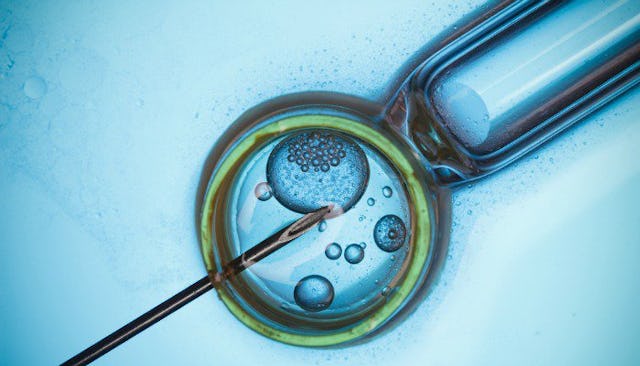The Infertility Story Behind My Facebook Pregnancy Announcement

A few weeks ago, I posted the news of my pregnancy on Facebook. I was torn about it, because I remembered how painful it was to see those kinds of posts not that long ago. But I also wanted to have a post of my own, so, so badly. It later dawned on me that it might look like this came easy to me—after all, I didn’t tell many of my friends that I was trying to become a single mother by choice. My family had no idea.
I didn’t post in January about the dismally low AMH levels that signaled that I was in the 5th percentile for my age, fertility-wise. I didn’t tell many friends about the hours I cried in my therapist’s office about how I was in my mid-30s, single and wanting to be a mom so badly, but was afraid that my time was running out. I said nothing about my fear that I “waited too long,” that despite the feminist I am, I feared that I had concentrated so much on advanced degrees and my career, that I missed my chance for motherhood.
I didn’t post back at the end of March when I started inseminations.
I said nothing to no one when I went on progesterone because of a luteal phase defect and remained quiet still when I started Clomid.
In June, when I had a very early miscarriage—or a “chemical pregnancy,” as they call it—only two friends knew, because I had texted them when those two pink lines showed up on the test that Wednesday. For almost a full day, it was perfect, until the spotting began. And then the next morning, the bright red blood—lots of it. I left the house only to go for blood work to check my levels and to my therapist’s office. By Monday, I was no longer pregnant. I was gutted.
I told no one I saw a new reproductive endocrinologist at the end of June to retest my hormone levels. My AMH went down again, my FSH doubled to near peri-menopause levels, and my one ovary showed only two follicles; the other showed none. She tactfully labeled my ovaries “quiet”; I called them lazy. Only my therapist knew the whole story. Once again, I logged hours crying in her office, convinced I would never be a mother, that my body was defective and broken.
I hated all of my friends on Facebook who were mothers. I passive-aggressively did not “like” their pictures of their kids or their pregnancy announcements. Everywhere I turned, people were having children. I almost deactivated my account because it was a minefield every time I logged on.
There was month after month of buying pregnancy tests and ovulation predictor kits. I got sick of peeing on things and being a slave to the calendar. I was tracking body temperature, checking cervical mucus, being on guard for every little symptom. After ovulation, I would obsessively check websites each day for “symptoms at x dpo.” And then every month, there were the negative pregnancy tests, the shock of blood on the toilet paper, the crying in the bathroom.
I neglected to post about the last insemination, when I saw an old sorority sister in the waiting room of the IVF clinic on a Saturday morning, when we were both getting blood drawn and ultrasounds done. We hadn’t seen each other in more than 10 years, but she sat down next to me and we started talking, both a little embarrassed and shy.
I didn’t post about the money I was wasting on these kits and tests, the horrible side effects of the Clomid, or the debilitating depression from the progesterone and infertility stress.
Instead, I only posted my happy news that I was expecting, keenly aware of how many of my Facebook friends were also either struggling with infertility or trying to conceive. When that sorority sister from the clinic messaged me to congratulate me, the irony was not lost on me—I was now on the other side. And I was wracked with guilt.
Because more often than not, I still feel like I have more in common with the women struggling with infertility than those who are pregnant or who are mothers. I feel almost like an interloper in this world of fecundity, like any minute, the doctor will call and say, “So sorry! There’s been a huge mistake! You’re not really pregnant.” I feel like I’m a bathroom trip away from seeing blood and losing this baby, because I know how tenuous it can be. After months of wanting something so badly and being afraid I was never going to get it, to finally have it is disorienting and unnerving. The crushing despair and desperation of those months, and the bleakness of the diagnosis of diminished ovarian reserve, is still very fresh. It makes me all the more thankful for this pregnancy, but the struggle to get here is still very raw.
So raw that I don’t want my name attached to this.
You won’t see any of that in a Facebook post.
This article was originally published on